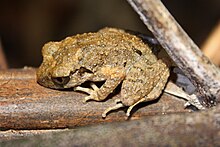Leptobrachella liui
| Leptobrachella liui | |
|---|---|

| |
| Scientific classification | |
| Domain: | Eukaryota |
| Kingdom: | Animalia |
| Phylum: | Chordata |
| Class: | Amphibia |
| Order: | Anura |
| Family: | Megophryidae |
| Genus: | Leptobrachella |
| Species: | L. liui |
| Binomial name | |
| Leptobrachella liui | |
| Synonyms[2] | |
| |
Leptobrachella liui, also known as Fujian Asian toad or Fujian metacarpal-tubercled toad, is a frog species in the family Megophryidae. Originally described from Chong'an in Fujian (present Wuyishan City), it is now known to be widely distributed in southern and southeastern China from Zhejiang and Fujian west to Guizhou and Guangxi.[2]

Description
Leptobrachella liui males grow to snout–vent length of 23–27 mm (0.91–1.06 in) and females to 25–28 mm (0.98–1.10 in). The toes have wide fringes and some webbing. The dorsum is grey brown with spots, with indistinct spots on the sides. The venter is immaculate. The iris is brownish.[3]
The tadpoles are 40–55 mm (1.6–2.2 in) long.[4]
Habitat and conservation
Leptobrachella liui occurs in hill streams and the surrounding forests and high-altitude grasslands at elevations of 110–1,400 m (360–4,590 ft) above sea level. Breeding takes place in streams. It is not considered threatened by the IUCN, although it can locally suffer from habitat destruction and degradation.[1]
References
- ^ a b Michael Wai Neng Lau, Geng Baorong (2004). "Leptobrachella liui". IUCN Red List of Threatened Species. 2004: e.T57568A11659030. doi:10.2305/IUCN.UK.2004.RLTS.T57568A11659030.en. Retrieved 16 November 2021.
- ^ a b Frost, Darrel R. (2020). "Leptobrachella liui (Fei and Ye, 1990)". Amphibian Species of the World: An Online Reference. Version 6.1. American Museum of Natural History. doi:10.5531/db.vz.0001. Retrieved 13 June 2020.
- ^ Ohler, A.; K. C. Wollenberg; P. Grosjean; R. Hendrix; M. Vences; T. Ziegler & A. Dubois (2011). "Sorting out Lalos: description of new species and additional taxonomic data on megophryid frogs from northern Indochina (genus Leptolalax, Megophryidae, Anura)". Zootaxa. 3147: 1–83.
- ^ Fei, L. (1999). Atlas of Amphibians of China (in Chinese). Zhengzhou: Henan Press of Science and Technology. p. 100. ISBN 7-5349-1835-9.

